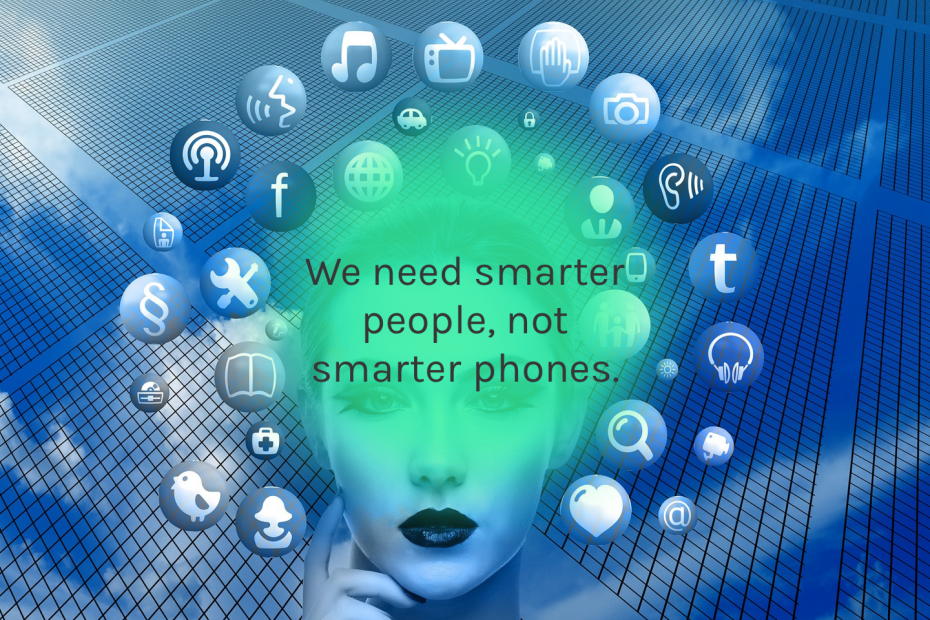What does it take for people to recognise a dystopia? I’ve been asking myself, and long-suffering others, variants of that question since the world went lala-crazy all those decades ago in …*checks notes*.. 2016.
First of all, you need to catch yourself. Which is kind of impossible when your head’s down at that 45-75 degree angle range reserved for your phone; when you’re sitting, walking, trying to work, failing at being intimate, or pretending to socialise IRL (In Real Life, which’d be a decent title for the dystopian film of our wretched age).
That’s how they get you. Facebook, Twitter, Instagram, TikTok, YouTube, Google, Uber. Any other shiny app your thumb finds before your rational brain has a chance to put its coat on.
They’re banking, massively, on the assumption that you can’t live without them anymore. They know negative emotions such as fear, jealousy and anger will win everytime in a gunfight against critical thinking, empathy and patience.
They’re ‘free’ too, so you hand over your data, not caring what data it is or how it is used, with no chance to take pride in it, or improve it. Under the Trojan Horse of convenience, they’re found a way past your hardware and are rewiring you from the inside out with evermore sophisticated algorithms. You’ve let them violate you and make you the product. To you it’s a mystery, a black box, so you act like it’s nothing to worry about.
If that sounds like an abusive relationship, where the trust you once had has vanished yet you still can’t escape, that’s because it is. Two-thirds of polled Facebook users don’t trust the platform with their data. Yet we stay, giving away everything in exchange for nothing.
That’s what first drew me to Smartup Zero. The notion that we don’t have to give away everything forever, and without question, in order to live full lives. To rebuild genuine trust, not the implied ‘trust’ where we act as though technology will deliver the solutions to our problems, regardless of the often-terrifying results.
But how do we do that? How do we make trust the currency of conscious, informed interactions, rather than being a head-down, unconscious slave to the currency of transactional convenience?
Relying on our zillionaire tech ‘heroes’ won’t work. Technology can certainly assist us in dealing with the symptoms of the incredibly complex problems within and outside ourselves, but to start addressing the underlying problems exposed by COVID-19 (and climate change, and biodiversity collapse and, and, and…), we need to rethink our social, political and economic structures.
We need traceable, transparent tech that doesn’t rely solely on the internet, where any data you choose to hand over is owned, governed and approved by you, and deleted when it’s served its purpose in the interaction. I truly believe that the Onlive platform, by Smartup Zero, can be the answer.
It can’t just be about the tech though. We need to think about organisations in a different, more democratic way. If data is the new oil, then rather than indulging a shadow economy that concentrates wealth and power for the few, we can simply stop providing them all that fuel.
We can achieve this through the Smartup method being pioneered by Smartup Zero, where new technologies that might just save the world (or humanity, at least) are created, owned and governed by us, not Big Tech.
Imagine a world in which our phones facilitate our IRL interactions, rather than stealing time, attention and energy away from the people we (used to?) care about. Where we can go to a restaurant, an exhibition, the pub, a sports event, a meeting, and feel informed and empowered, as we rebuild our trust with data and connectivity.
Until now, we’ve been swapping our Data Dignity for convenience and information. But as the curtain keeps getting pulled back time, and time, and time again, scales will inevitably fall from eyes, and we may just realise what a shitty hand we’ve been dealt. Maybe the concept of ‘trust’ in data-churning behemoths will fall by the wayside, to be replaced by the long-term progressivism of trustworthiness. Maybe we’ve already started lifting our heads to recognise our dystopia. Maybe it isn’t too late.
What is certain however, is that the power can be in our hands. Our data can be used as we want it to be, when we want it to be. We can rely on more than just squirts of dopamine in exchange for our autonomy, and indeed, our souls. We can work together with best intentions to deal with global issues on a manageable, local level.
That’s the promise of Smartup Zero and the Onlive platform.
Let’s do something great with it.

Muchas gracias. ?Como puedo iniciar sesion?